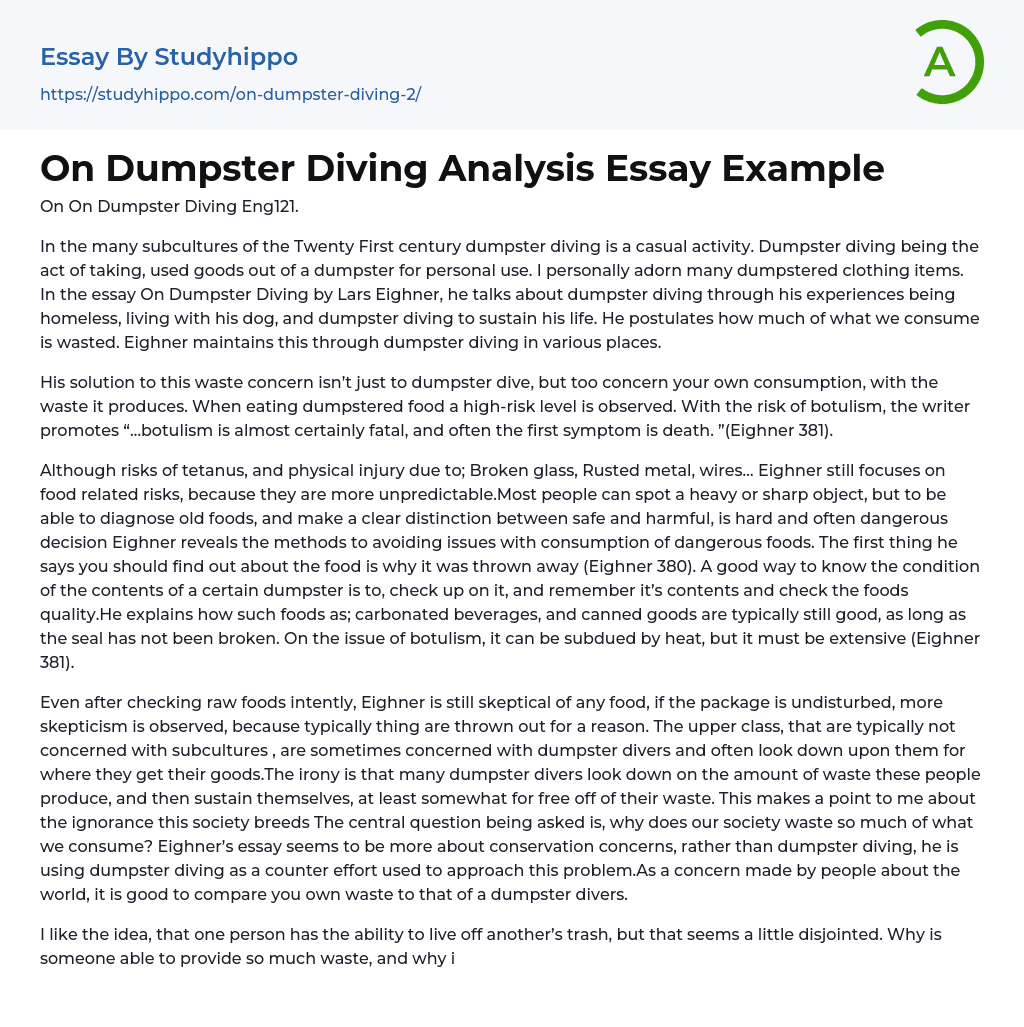In the many subcultures of the Twenty First century dumpster diving is a casual activity. Dumpster diving being the act of taking, used goods out of a dumpster for personal use. I personally adorn many dumpstered clothing items. In the essay On Dumpster Diving by Lars Eighner, he talks about dumpster diving through his experiences being homeless, living with his dog, and dumpster diving to sustain his life. He postulates how much of what we consume is wasted. Eighner maintains this through dumpster diving in various places.
His solution to this waste concern isn’t just to dumpster dive, but too concern your own consumption, with the waste it produces. When eating dumpstered food a high-risk level is observed. With the risk of botulism, the writer promotes “…botulism is almost certainly fatal, and often the first sympto
...m is death. ”(Eighner 381).
Although risks of tetanus, and physical injury due to; Broken glass, Rusted metal, wires… Eighner still focuses on food related risks, because they are more unpredictable.Most people can spot a heavy or sharp object, but to be able to diagnose old foods, and make a clear distinction between safe and harmful, is hard and often dangerous decision Eighner reveals the methods to avoiding issues with consumption of dangerous foods. The first thing he says you should find out about the food is why it was thrown away (Eighner 380).
A good way to know the condition of the contents of a certain dumpster is to, check up on it, and remember it’s contents and check the foods quality.He explains how such foods as; carbonated beverages, and canned goods are typically still good, as long as the seal has
not been broken. On the issue of botulism, it can be subdued by heat, but it must be extensive (Eighner 381).
Even after checking raw foods intently, Eighner is still skeptical of any food, if the package is undisturbed, more skepticism is observed, because typically thing are thrown out for a reason. The upper class, that are typically not concerned with subcultures , are sometimes concerned with dumpster divers and often look down upon them for where they get their goods.T
he irony is that many dumpster divers look down on the amount of waste these people produce, and then sustain themselves, at least somewhat for free off of their waste. This makes a point to me about the ignorance this society breeds The central question being asked is, why does our society waste so much of what we consume? Eighner’s essay seems to be more about conservation concerns, rather than dumpster diving, he is using dumpster diving as a counter effort used to approach this problem.As a concern made by people about the world, it is good to compare you own waste to that of a dumpster divers.
I like the idea, that one person has the ability to live off another’s trash, but that seems a little disjointed. Why is someone able to provide so much waste, and why is someone in the position to have to live off of another, We are humans, not parasites, I think that dumpster diving can be destructive socially, because a dumpster diver can’t actually expect anything from any particular dumper, to waste.
- Food Safety essays
- Food Security essays
- Beverages essays
- Cuisines essays
- Dairy essays
- Desserts essays
- Fast Food essays
- Bread essays
- Meal essays
- Meat essays
- Organic Food essays
- Rice essays
- Sugar essays
- Taste essays
- Beef essays
- Coconut essays
- Crowd essays
- Dinner essays
- Juice essays
- Sainsbury essays
- Cooking essays
- Ginger essays
- Oreo essays
- Drink essays
- Beer essays
- Wine essays
- Coffee essays
- Tea essays
- Cake essays
- Hamburger essays
- Ice Cream essays
- Burger essays
- Pizza essays
- Fruit essays
- Lemon essays
- Food Waste essays
- Favorite Food essays
- Alcoholic essays
- Soft Drinks essays
- Cookie essays
- Starch essays
- Yeast essays
- Cola essays
- Pizza Hut essays
- snack foods essays
- chips essays
- Biscuit essays
- Brewing essays
- Brewery essays
- Dumpster Diving essays




